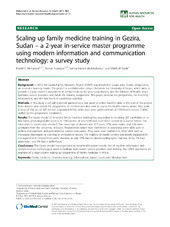| dc.contributor.author | Mohamed, Khalid Gaffer | en_US |
| dc.contributor.author | Hunskaar, Steinar | en_US |
| dc.contributor.author | Abdelrahman, Samira Hamid | en_US |
| dc.contributor.author | Malik, Elfatih M. | en_US |
| dc.date.accessioned | 2014-10-22T13:05:37Z | |
| dc.date.available | 2014-10-22T13:05:37Z | |
| dc.date.issued | 2014-01-21 | eng |
| dc.identifier.issn | 1478-4491 | |
| dc.identifier.uri | https://hdl.handle.net/1956/8665 | |
| dc.description.abstract | Background: In 2010 the Gezira Family Medicine Project (GFMP) was initiated in Gezira state, Sudan, designed as an in-service training model. The project is a collaboration project between the University of Gezira, which aims to provide a 2-year master’s programme in family medicine for practicing doctors, and the Ministry of Health, which facilitates service provision and funds the training programme. This paper presents the programme, the teaching environment, and the first batch of candidates enrolled. Methods: In this study a self-administered questionnaire was used to collect baseline data at the start of the project from doctors who joined the programme. A checklist was also used to assess the health centres where they work. A total of 188 out of 207 doctors responded (91%), while data were gathered from all 158 health centres (100%) staffed by the programme candidates. Results: The Gezira model of in-service family medicine training has succeeded in recruiting 207 candidates in its first batch, providing health services in 158 centres, of which 84 had never been served by a doctor before. The curriculum is community oriented. The mean age of doctors was 32.5 years, 57% were males, and 32% were graduates from the University of Gezira. Respondents stated high confidence in practicing some skills such as asthma management and post-abortion uterine evacuation. They were least confident in other skills such as managing depression or inserting an intrauterine device. The majority of health centres was poorly equipped for management of noncommunicable diseases, as only 10% had an electrocardiography machine (ECG), 5% had spirometer, and 1% had a defibrillator. Conclusions: The Gezira model has responded to local health system needs. Use of modern information and communication technology is used to facilitate both health service provision and training. The GFMP represents an example of a large-volume scaling-up programme of family medicine in Africa. | en_US |
| dc.language.iso | eng | eng |
| dc.publisher | BioMed Central | eng |
| dc.rights | Attribution CC BY | eng |
| dc.rights.uri | http://creativecommons.org/licenses/by/2.0 | eng |
| dc.subject | Family medicine | eng |
| dc.subject | In-service training | eng |
| dc.subject | Telemedicine | eng |
| dc.subject | Sudan | eng |
| dc.subject | Curriculum development | eng |
| dc.title | Scaling up family medicine training in Gezira, Sudan – a 2-year in-service master programme using modern information and communication technology: a survey study | en_US |
| dc.type | Peer reviewed | |
| dc.type | Journal article | |
| dc.date.updated | 2014-01-24T00:09:20Z | |
| dc.description.version | publishedVersion | en_US |
| dc.rights.holder | Khalid G Mohamed et al.; licensee BioMed Central Ltd. | |
| dc.rights.holder | Copyright 2014 Mohamed et al.; licensee BioMed Central Ltd | |
| dc.source.articlenumber | 3 | |
| dc.identifier.doi | https://doi.org/10.1186/1478-4491-12-3 | |
| dc.identifier.cristin | 1162315 | |
| dc.source.journal | Human Resources for Health | |
| dc.source.40 | 12 | |

